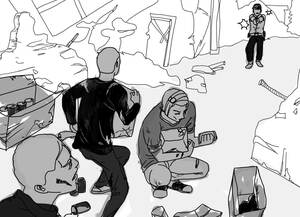Lawlessness in Haiti a matter of survival
As if last week’s earthquake didn’t rattle Haiti enough, the country endured severe aftershocks this week while Guatemala, Venezuela and Argentina were shaken by earthquakes of their own. These natural disasters continue to be a focal point for headlines, and the frustrations that accompany the unfathomable loss and the difficulties of providing aid to the torn country of Haiti persist.
The media has been chronicling the progress and predicaments that follow disaster — the primary problem being the lack of clean water and food supplies. Another problem has arisen, however, that is of a more societal nature.
In Haiti, looters have been going on sprees through home goods stores, the Marché Hyppolite market and debris strewn streets, rummaging for food and other supplies. The police, aid workers and other survivors perceive looters as threats to the already-desperate Port-au-Prince as they take unfair advantage of the vulnerability of the situation and disrupt the relief efforts being made in the capital. Furthermore, they display blatant disregard for corpses that are strewn about, clawing past them in order to obtain valuable goods in a savage fashion.
The problem of looters is considered a severe hurdle in achieving effective distribution of aid — they unfairly hoard resources, depriving those who follow the law of much needed aid. Compounding this issue is the fact that the Haitian police have had trouble keeping peace and order in the capital. Police have opened fire on a number of Haitians found to be looting, with at least one incident caught on video.
Ten days after the quake, patience is wearing thin.
In addition, the media divides Haitians into two discrete camps — survivors, painted as courageous and strong-willed women and children, and looters, who appear to be selfish, Hobbesian outlaws. But to be fair, looters are survivor, too. That said, the police’s open fire on these survivors prompts some unusual questions about the justness of the response.
Though they may technically be considered “looters” in that they are stealing things found among the ruins, it’s difficult to simply discount them as criminals. Such a violent response to the behavior seems neither necessary nor fair. Opening fire on the looters only succeeds in stemming that particular riot but does not prevent future incidents. During dire times, a nasty, brutish state of nature becomes the standard, and it’s every man for himself.
Don’t desperate times call for desperate measures?
Of course, Haiti’s case is an unusual one — there is no government in sight, yet the law enforcers are still at work.
“The big question is, ‘Who’s in charge?’” former Haitian Prime Minister Michèle Pierre-Louis said. “We don’t feel as though there is someone organizing all this.”
Pierre-Louis is right. Haitian President René Préval waited until Jan. 20th to address the distraught island nation — eight full days after the earthquake. Haiti is now reliant on international aid, which simply doesn’t seem to be funneling into the country fast enough. Quasi-anarchy might indeed be brewing in the Haitian capital, as there is no proper authority or government arranging the relief efforts. Government officials have gone under the radar since the collapse of the presidential palace, a haunting metaphor for a government gone defunct. And in place of that government, the local police, coupled with international troops and aid workers, have swooped in, creating a tense environment that has exacerbated a myriad of other post-quake problems faced by Haitians.
Taking all this into consideration, perhaps it’s wrong to accuse the police of unnecessary and unjust violence. Their intention is to quell the violence in hopes of securing stability so that organized action can take place. In the midst of this apparent lawlessness and widespread loss, a sense of order may be the most sought-after commodity.
But while there is certainly a need to restore and maintain order, using violence might not be the solution. Though such a perspective would be different had we, say, been looted ourselves, it simply does not seem fair to punish people for using their survival instincts. In reality, especially in the absence of a functioning government, each person will take steps to stay alive by any means necessary.
In ordinary circumstances, lawlessness is inexcusable. But when survivors are rummaging for food, displaying “barbaric” behavior borne of necessity and met with gruesome endings, that in itself, should be considered problematic.
Nadine Tan is a sophomore majoring in business administration. Her column “World Rapport” runs Fridays.



Great perspective! It’s always hard to believe you’re only 19.
I disagree! There is no excuse for violence. If ever there was a time to come together and share it was after the tragedy.